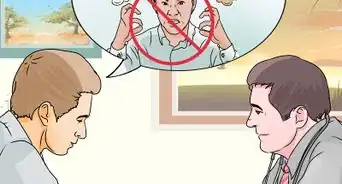This article was co-authored by Liana Georgoulis, PsyD. Dr. Liana Georgoulis is a Licensed Clinical Psychologist with over 10 years of experience, and is now the Clinical Director at Coast Psychological Services in Los Angeles, California. She received her Doctor of Psychology from Pepperdine University in 2009. Her practice provides cognitive behavioral therapy and other evidence-based therapies for adolescents, adults, and couples.
There are 18 references cited in this article, which can be found at the bottom of the page.
This article has been viewed 110,061 times.
Sometimes, mood swings come out of nowhere without warning. Feelings can quickly go from happy to sad to extremely angry. This can be extremely annoying and confusing! It can be hard to know what to do when experiencing a mood swing, or how to handle other people's reactions. The good news is there are things you can do to help you through dealing with your mood swings.
Steps
Coping with Mood Swings
-
1Grab a snack. Make sure you eat regularly and eat the right foods. This means staying away from loads of sugar and including a balance of carbohydrates, protein, fruits, and veggies every day. If you skip a meal or don't eat enough, notice if this affects your mood. Make sure you're eating regularly to avoid mood swings related to hunger.[1]
- A diet that is high in saturated fats and caloric levels may lead to depression.[2]
- Those who consume more water, fiber, ascorbic acid, tryptophan, magnesium and selenium have better moods overall. Diets that are heavy on legumes, fruits and vegetables, such as the Mediterranean diet, meet these criteria.[3]
- Add folic acid, which can be found in leafy greens and beans.[4]
-
2Get your blood pumping. Exercise can help you improve your mood, increase self-esteem, and improve sleep.[5] When you exercise, your body releases endorphins, which help you get into a better mood and de-stress. Exercise is good for physical and emotional health. [6]
- It's recommended that teens get one hour of exercise almost every day.[7]
- Maybe you hate sports, but that doesn't mean you can't exercise. Walk the dog, jump on the trampoline, go in-line skating, or go dancing.
Advertisement -
3Get some sleep. Not getting enough sleep definitely affects mood swings. It can be hard to get enough sleep sometimes when your friends want to talk or hang out at night, but remember that it's important to get enough sleep so that you can feel your best.[8] If you can, tell them that you will talk to them the next day and that you need enough sleep. [9] Of course you don't want to miss out on hanging out with your friends, but don't make it an every night thing.
- It's suggested that teens and pre-teens get 8 to 10 hours of sleep each night.[10]
-
4Avoid caffeine. Caffeine can interrupt your sleep. It can also cause nervousness, anxiety, shakiness, and dehydration.[11] If you experience moodiness frequently, remove caffeine and see if it helps. It may be that one thing that pushes you over the edge.[12]
- The effects of caffeine are typically felt within five to 10 minutes and may last from one to five hours. Aftereffects may last for up to 24 hours.[13]
- A strong dose of caffeine may lead to jitteriness, increased heart rate, irritability, and restlessness.[14] A strong dose is between 150-400 mg. (A coffee contains roughly 150 mg per 12 oz.; an energy drink is in excess of 100 mg per 12 oz; a diet coke is around 46mg per 12oz (or one can).)[15]
- If you do consume caffeine, try not to exceed 50-150 mg, or about one 12oz cup of coffee.[16]
-
5Talk to someone. Sometimes you may want to be left alone and avoid people altogether, and that's okay. But it's also important to spend time with friends. Maybe you have one friend you can tell everything to; talk to her and let her know how you're feeling. Talk to a trusted adult, such as a parent, guidance counselor, or coach. [17]
- Talk to your best friend, or maybe say hello to your crush.
-
6Understand that mood swings can indicate more serious disorders. Sometimes mood swings are just mood swings, while other times they can indicate a more serious disorder. If your mood swings are more intense than other girls', talk to a trusted adult about seeing a mental health professional to explore other causes. [18]
- If you've noticed other symptoms, such as racing thoughts, incoherence, disjointed thoughts, or periods of excessive energy, this can indicate symptoms of other more serious disorders. Talk to an adult and a mental health professional.
Handling Your Emotions
-
1Cool off. If you're feeling angry, this step is very important, and if you skip it, you may do some things that you may regret in the future. If you push on with a bad mood, you won't be able to think clearly and you might lash out more often.[19] If you are with someone else or a group of people, try to find a way to escape or excuse yourself; maybe leave to go to the bathroom.[20]
- Once you're alone, take some time to calm down. Count to 10 or take some deep breaths. Splash some water on your face. Focus on your senses and engaging with your environment, not just what you're feeling.
-
2Cry. It's long past time to put to rest the notion that crying is “for babies” and is inappropriate. Many people feel ashamed of crying, but it's a totally natural and healthy release of emotions. There are actually some health benefits to shedding tears: hormones and toxins which build up during stress are released when you cry emotional tears. [21] Don't hold back! Let yourself cry.
- Maybe you feel embarrassed to cry in public. If this happens, excuse yourself to the bathroom or go outside.
-
3Be aware of negative thoughts. It can be easy to get into a downward spiral of negative thinking. Before you know it, these negative thoughts start affecting how you feel. Be on the lookout for these common negative thought patterns:
- All-or-nothing thinking: Either you believe everything is perfect and wonderful, or everything is horrible and you hate life.
- Jumping to conclusions: You “know” that things will turn out badly, or assume people are thinking negatively of you even if there is no concrete proof.
- Catastrophizing: You blow the situation out of proportion and believe you can never show your face again or that life is ruined.
-
4Challenge negative thoughts and think positively. If your thoughts are spiraling into "Nobody likes me and I'm all alone," "Everything sucks," and "I'll never be happy," try to catch yourself when you start falling into these traps. Stop and challenge these thoughts by testing whether or not they are really true. Having a positive outlook is associated with health and psychological benefits, such as lower rates of depression and distress and having a longer lifespan.[22] [23] Take a moment and find new ways to re-think what goes through your mind as negative.
- Look at the evidence. When you think "Nobody likes me and I'm all alone," think about whether or not that is really true. The evidence "for" that statement might be that your best friend was really mean to you at lunch and you feel really alone. The evidence "against" that statement is that you have many other friends who care about, your parents and your family love you. Maybe your best friend's parents are getting divorced, and her behavior has absolutely nothing to do with you.
- Stop negative thoughts such as "everything sucks," and change them into positive thoughts. You can think, "No, not everything sucks. Even though I feel really down right now, I know my chinchilla loves me, and I'm excited to see a movie later tonight."
-
5Write down your feelings. Getting your feelings out on paper will help calm your stress and understand what is going on inside. Often, people will be confused by how they are feeling, and writing feelings down helps you know how to solve your problem(s).
- While it can be helpful to write out confusing feelings, don't make your journal all about negativity. Consider writing about a pleasant experience too, to move you closer to feeling more positive emotions.
Understanding Your Body and Emotions
-
1Recognize what causes mood swings. Becoming a teenager is hard work. As your body goes through lots of changes, hormones rewire your body (and emotions!) to want independence and social position. This means that you want to do things for yourself and not have people telling you what to do. It also means that you're trying to find how you “fit in,” see where you belong, and how you are unique among your friends.[24]
-
2Figure out if it's related to PMS. Throughout the month, your hormone levels change. Surprisingly, this happens to boys too, but to a smaller degree. Sometimes, girls notice a week that makes them feel moody. Start tracking your periods to figure out if it's related PMS (pre-menstrual syndrome). PMS happens about a week before your period, and can include changes in food cravings, mood swings, weight, and your desire for sex.[25]
- Use a calendar or a smartphone app designed to track your period. You want to start tracking on the first day of your period. This can give you clues whether your mood swings are consistent with your period.
- Cut salt, caffeine, and sugar to help with PMS symptoms. [26]
-
3Recognize if the mood swings can be attributed to any recent stress. This can be a breakup with a best friend or boyfriend, the loss of a family member or pet, or being a victim of violence or abuse. If you've noticed strong mood swings following a difficult or traumatic event, they may indicate a feeling of overwhelming stress.[27]
- Figure out whether you can work through the event on your own or if you need to ask someone (like a trusted adult or therapist) for help.
- If you have experienced trauma or abuse, you absolutely need the assistance of a professional to work through the trauma.
Expert Q&A
-
QuestionWhat can I do to stop my family members from taking my mood swings personally?
 Allison Broennimann, PhDDr. Allison Broennimann is a licensed Clinical Psychologist with a private practice based in the San Francisco Bay Area providing psychotherapy and neuropsychology services. With over a decade of experience, Dr. Broennimann specializes in in-depth psychotherapy to provide solution-focused treatments for anxiety, depression, relationship problems, grief, adjustment problems, traumatic stress, and phase-of-life transitions. And as part of her neuropsychology practice, she integrates depth psychotherapy and cognitive rehabilitation for those recovering after traumatic brain injury. Dr. Broennimann holds a BA in Psychology from the University of California, Santa Cruz, and an MS and Ph.D. in Clinical Psychology from Palo Alto University. She is licensed by the California Board of Psychology and is a member of the American Psychological Association.
Allison Broennimann, PhDDr. Allison Broennimann is a licensed Clinical Psychologist with a private practice based in the San Francisco Bay Area providing psychotherapy and neuropsychology services. With over a decade of experience, Dr. Broennimann specializes in in-depth psychotherapy to provide solution-focused treatments for anxiety, depression, relationship problems, grief, adjustment problems, traumatic stress, and phase-of-life transitions. And as part of her neuropsychology practice, she integrates depth psychotherapy and cognitive rehabilitation for those recovering after traumatic brain injury. Dr. Broennimann holds a BA in Psychology from the University of California, Santa Cruz, and an MS and Ph.D. in Clinical Psychology from Palo Alto University. She is licensed by the California Board of Psychology and is a member of the American Psychological Association.
Clinical Psychologist Unless your friends and family have been in a similar mood, they may not understand what you're experiencing. Therefore, it's important to communicate with your family, if you feel safe doing so, about what's going on to help them understand. It's really a matter of communicating.
Unless your friends and family have been in a similar mood, they may not understand what you're experiencing. Therefore, it's important to communicate with your family, if you feel safe doing so, about what's going on to help them understand. It's really a matter of communicating.
References
- ↑ https://www.psychologytoday.com/blog/everybody-is-stupid-except-you/201106/when-hunger-leads-anger-noticing-external-influences-mood
- ↑ https://www.psychologytoday.com/blog/your-brain-food/201504/recent-links-between-food-and-mood?collection=1073403
- ↑ https://www.psychologytoday.com/blog/your-brain-food/201504/recent-links-between-food-and-mood?collection=1073403
- ↑ https://www.nlm.nih.gov/medlineplus/druginfo/natural/1017.html
- ↑ Liana Georgoulis, PsyD. Licensed Psychologist. Expert Interview. 6 September 2018.
- ↑ http://www.apa.org/monitor/2011/12/exercise.aspx
- ↑ http://kidshealth.org/parent/nutrition_center/staying_fit/fitness_13_18.html
- ↑ Liana Georgoulis, PsyD. Licensed Psychologist. Expert Interview. 6 September 2018.
- ↑ https://sleepfoundation.org/sleep-topics/teens-and-sleep
- ↑ https://sleepfoundation.org/how-sleep-works/how-much-sleep-do-we-really-need
- ↑ Liana Georgoulis, PsyD. Licensed Psychologist. Expert Interview. 6 September 2018.
- ↑ http://www.webmd.boots.com/children/features/teenage-mood-swings?page=3
- ↑ http://www.ceusource.com/texts/effects_of_caffeine.html
- ↑ http://www.ceusource.com/texts/effects_of_caffeine.html
- ↑ http://www.ceusource.com/texts/effects_of_caffeine.html
- ↑ http://www.ceusource.com/texts/effects_of_caffeine.html
- ↑ http://kidshealth.org/teen/your_mind/emotions/bad_mood.html#
- ↑ http://www.medicinenet.com/mood_swings/symptoms.htm
- ↑ Liana Georgoulis, PsyD. Licensed Psychologist. Expert Interview. 6 September 2018.
- ↑ http://www.helpguide.org/articles/emotional-health/anger-management.htm
- ↑ https://www.psychologytoday.com/blog/emotional-freedom/201007/the-health-benefits-tears
- ↑ Liana Georgoulis, PsyD. Licensed Psychologist. Expert Interview. 6 September 2018.
- ↑ http://www.mayoclinic.org/healthy-lifestyle/stress-management/in-depth/positive-thinking/art-20043950
- ↑ http://www.webmd.boots.com/children/features/teenage-mood-swings
- ↑ http://www.womenshealth.gov/publications/our-publications/fact-sheet/premenstrual-syndrome.html
- ↑ http://www.womenshealth.gov/publications/our-publications/fact-sheet/premenstrual-syndrome.html
- ↑ http://www.psychguides.com/guides/trauma-symptoms-causes-and-effects/
-Step-1.webp)










































































